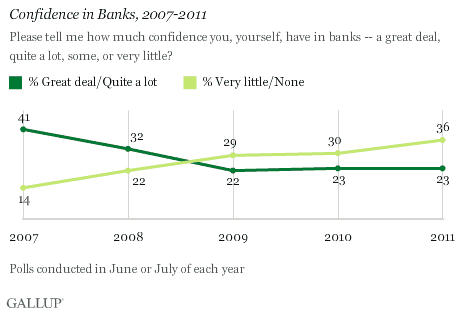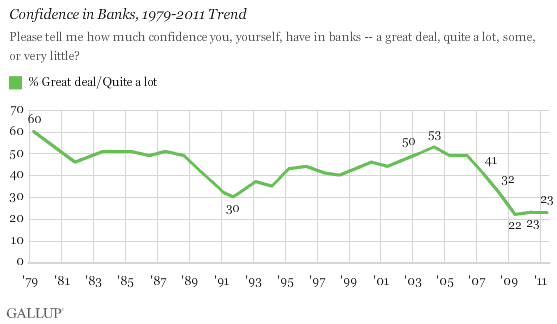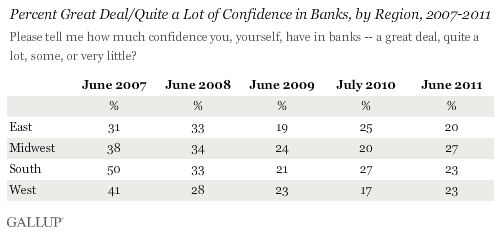PRINCETON, NJ -- Thirty-six percent of Americans have "very little" or "no" confidence in U.S. banks -- up from 30% last year and the highest on record. For the third consecutive year, more Americans express little or no confidence in banks than say they have "a great deal" or "quite a lot."

Gallup has tracked the percentage of Americans saying they have a great deal or quite a lot of confidence in U.S. banks since 1979. Prior to 2009, the percentage of Americans expressing very little or no confidence in U.S. banks was generally far less than the percentage expressing a great deal or quite a lot of confidence. As recently as June 2007, before the recession began -- and even in June 2008, just prior to the financial crisis later that year -- more Americans had confidence in U.S. banks than had little or no confidence.
The 23% of Americans with a great deal or quite a lot of confidence in banks in 2011 is unchanged from last year and essentially the same as the 22% of 2009. All three annual measures are not only far below the pre-recession level of 41% found in June 2007, but also represent a new low in Gallup's annual Confidence in Institutions poll.

This year's poll finds Americans expressing the most confidence in the U.S. military, at 78%, followed by small businesses, at 64%. Americans rank banks 12th out of 16 institutions measured.
Confidence Down in All Regions From Pre-Crisis Levels
The degree of confidence in banks has fallen in all regions of the country compared with the pre-recession/financial crisis days of 2007. However, confidence in banks is up in the Midwest and West compared with a year ago. These improvements may be at least in part a result of the strengthening of the manufacturing sector, as it has been of particular benefit to the economy and companies in these regions.

Confidence in U.S. Banks Remains Fragile
Three years after the financial crisis gripped the U.S., more Americans express very little or no confidence in U.S. banks. Of course, as demonstrated during the financial crisis, confidence is essential to having a well-functioning financial system. And, a strong financial system is integral to sustainable economic growth and job creation.
With confidence in banking remaining so low and worsening on the margin, it is clear that the banking industry, banking regulators, and other policymakers need to do more to improve the confidence Americans have in banking institutions. These new Gallup poll results suggest that any such efforts, at least to this point, have been highly unsuccessful.
Survey Methods
Results for this Gallup poll are based on telephone interviews conducted June 9-12, 2011, with a random sample of 1,020 adults, aged 18 and older, living in the continental U.S. selected using random digit dial sampling.
For results based on the total sample of national adult, one can say with 95% confidence that the maximum margin of sampling error is ±4 percentage points.
Interviews are conducted with respondents on landline telephones and cellular phones, with interviews conducted in Spanish for respondents who are primarily Spanish-speaking. Each sample includes a minimum quota of 400 cell phone respondents and 600 landline respondents per 1,000 national adults, with additional minimum quotas among landline respondents for gender within region. Landline telephone numbers are chosen at random among listed telephone numbers. Cell phone numbers are selected using random-digit-dial methods. Landline respondents are chosen at random within each household on the basis of which member had the most recent birthday.
Samples are weighted by gender, age, race, Hispanic ethnicity, education, region, adults in the household, and phone status (cell phone only/landline only/both, cell phone mostly, and having an unlisted landline number). Demographic weighting targets are based on the March 2010 Current Population Survey figures for the aged 18 and older non-institutionalized population living in U.S. telephone households. All reported margins of sampling error include the computed design effects for weighting and sample design.
In addition to sampling error, question wording and practical difficulties in conducting surveys can introduce error or bias into the findings of public opinion polls.
For more details on Gallup's polling methodology, visit www.gallup.com.
